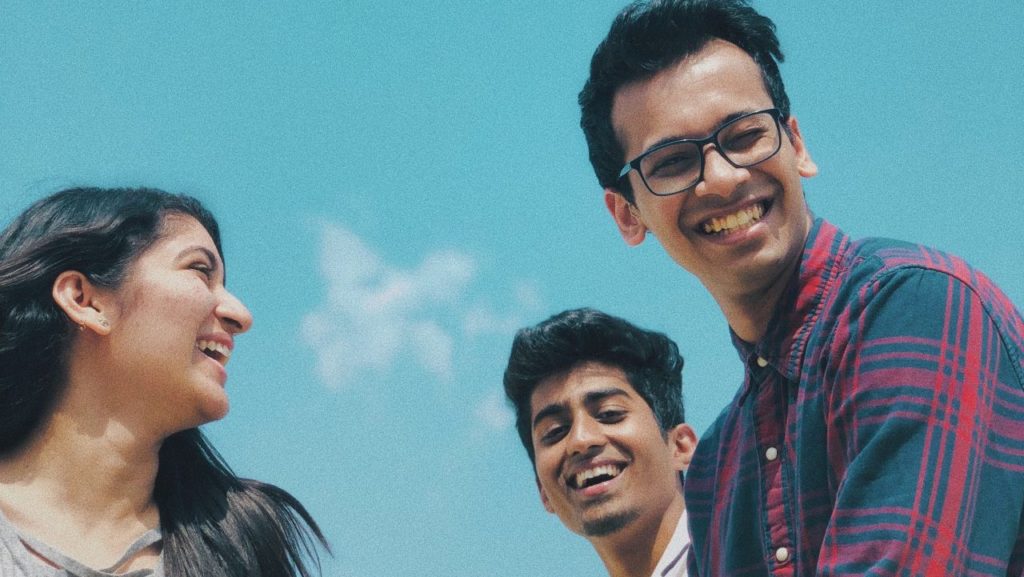“We’re just friends.”
I hate that saying. It implies that friendship is something less than a romantic relationship. For me, a single woman in my late twenties, that just isn’t the case. Close friendships are my most valuable relationships, and I wouldn’t have made it to where I am without them.
Dating advice is pretty prevalent wherever I look on my news feed, but friendship is often overlooked as something easy that everyone should automatically know how to do. The thing is, friendship isn’t always easy; sometimes it’s painful and hard. And when you believe you’re just friends with someone, it can make it easier to walk away from a relationship rather than put in the effort to resolve tension or strife.
Throughout high school and college, I liked the idea of being a loner because it meant I didn’t have to open up to anyone. I had friends, and we had our deep talks, sure, but when it came down to the nitty gritty, it was mostly me listening and them talking. I didn’t want to be vulnerable in front of other people, and I think that made my friendships shallower than they should have been. Now that I’m adult, things have changed; I don’t need friends in the same way that I used to, but they have also come to be something so much more valuable.
Why Bother?
Friends were important when I was growing up because they helped me discover who I was, who I wanted to be, where I fit in with my peers and how to navigate the pressure-filled waters of childhood. I generally made friends based on circumstances and proximity. You sit next to me in English class and actually care what the teacher is talking about too? Let’s be buddies. (Yes, I was one of those boring, achievement-driven students.)
Now that I’m an adult, though, I don’t need friends to figure out who I am, and circumstances are less likely to make me reach out to someone new – I’m comfortable being on my own and don’t need friends to validate me. Sitting next to a stranger at a concert or a meeting? We might exchange a few words, but I’m probably not considering them my new BFF.
However, the benefits of adult friendship are undeniable. In fact, even science can attests to this. A recent study showed that cancer patients with strong social support networks had much lower levels of a protein linked to more aggressive cancers, making their chemotherapy treatments more effective. Patients in a support group lived longer and said they experienced less pain. Also, those with a group of friends to support them experience less stress and cardiovascular and immune problems.
“There may be broader effects as well,” says psychology professor at Carnegie Mellon University, Sheldon Cohen, PhD. “Friends encourage you to take better care of yourself. And people with wider social networks are higher in self-esteem, and they feel they have more control over their lives.”
Indeed, having a strong social network is linked to longevity and a better quality of life.
In addition to those benefits, though, I really appreciate that most of my adult friendships are based on shared interests. Outside of school and work, it’s hard to find things to talk about if you have nothing in common. But when I meet someone who also loves Star Wars, enjoys snowboarding, or is an artist, I am immediately excited to talk to them. I’ve also found it incredibly rewarding reaching out to the wisdom of older friends and being a mentor to younger ones.
What’s in a Friend?
The quality of friendships I’ve made later in life are generally more fulfilling than the friendships I developed by default during my childhood, even though my relationships now take more energy and time.
Often, people don’t realize they’ve neglected to cultivate deep friendships in their adulthood until a crisis comes along. Perhaps this takes the form of an illness, a death in the family or a firing from a job.
I can count on one hand the people I trust enough to come to with emotional baggage during a crisis. And that’s all I need. But if I didn’t have those people during the difficult times in my life, I would have continued digging my own pit of despair, and I’m not sure how I would have climbed out of it.
Personally, I hate talking about my emotions. I hate feeling vulnerable. I hate admitting weakness. But when catastrophe strikes, I’m emotional, vulnerable and weak. There is something comforting about having the pain you are going through acknowledged. Even a simple, “Wow, that really sucks” from a friend makes me feel vindicated. Add a nonjudgmental attitude and unconditional love, and I am given the strength I need to move on.
However, the unfortunate reality of trusting someone so deeply is that you also give them the power to hurt you so deeply. My friends are human, which means they aren’t perfect.
Some friends argue more than others. Most of my close friendships are pretty smooth sailing because I am a pretty laid back person and I tend to befriend other laid back people. This means if we ever do clash, I take it hard.
One of my best friends, who I’ve been close with for many years, and I snapped at each other the other day. We were both exhausted and extremely stressed from outside sources, and it all culminated in an argument about how we had felt the other let us down. I was shocked that we were arguing, and it bothered me so much that I burst into tears (and I don’t cry very often), felt physically ill and couldn’t sleep that night. My mind would not shut down until we had resolved the issue and forgiven each other.
That is the power my friends have over me. But it is a power I freely give with the understanding that I, too, am imperfect, and if we care enough about each other we will work out our differences and come out stronger friends for them. That willingness to compromise is a product of humility, something I find invaluable in a friend.
Why Is It So Hard to Make Friends After College?
In a New York Times article from a few years ago, Alex Williams commented on this issue, writing:
As people approach midlife, the days of youthful exploration, when life felt like one big blind date, are fading. Schedules compress, priorities change and people often become pickier in what they want in their friends. No matter how many friends you make, a sense of fatalism can creep in: the period for making B.F.F.’s, the way you did in your teens or early 20s, is pretty much over.
Though we might have 800 friends on Facebook and 500 followers on Twitter, when the number of people we would actually call to hang out with dwindles, it’s hard to know how to make new connections. Williams comments that there are three conditions necessary to making new friends: “proximity; repeated, unplanned interactions; and a setting that encourages people to let their guard down and confide in each other.”
Trying to manufacture those things is difficult, to say the least. Though with the age of the internet and communication technology, proximity might not be as big a factor as it used to be (personally, I’ve made a lot of new friends by playing online video games – friends I actually meet and hang out with in person).
Two major draws for friendships are common interests and shared values. When I moved to a new city a few years ago, finding a church and a small group was crucial for my developing new relationships. Also, I love gaming. I joined some RPG groups and have met some great people by doing so. Actively searching for people who share you interests, joining groups and attending events are often the best ways to make new relationships. Of course, they are also the most difficult because you have to put yourself out there.
Behavioral scientists describe a close friendship as an enduring bond of self-sacrifice and shared moments. A true friend loves unconditionally, respects your beliefs, prioritizes your happiness, works through the rough times, forgives your humanity and you miss them when they’re gone.
Those kinds of friendships are worth searching for.
Copyright 2016 Allison Barron. All rights reserved.












